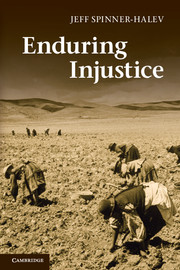6 - Elusive justice
Published online by Cambridge University Press: 05 June 2012
Summary
Many scholars writing about historical injustice suggest that if the larger political community just understands the past better, the injustice can be undone. These arguments are rarely accompanied by an argument about how to move past the injustice, and so the assumption seems to be that if the roadblocks are dismantled, then liberal justice can simply triumph. But this is often simply not the case. The idea of progress is implicit in many of these arguments, the idea that liberalism can uplift all. Another set of scholars suggests that past injustice needs to be undone, usually when the matter is land, which can be returned. Yet matters are not so simple. When we think of enduring injustice, we will often have to think of tragic narratives. The shift in gaze I am urging here involves altering our view of progress. When we begin in the past, and move progressively toward the future, the idea of a narrative of progress follows readily enough. When we begin in the present and look toward the past with an eye toward the future, the structure of our quest does not always match a progressive narrative. David Scott argues: “For tragedy, history is not leading us anywhere in particular. And if the past is a wound, it is one that may not heal.” While I borrow Scott's argument about certain narratives being read as tragedy instead of romance (in which matters improve), his pessimism is not always warranted. The future does not triumphantly grow out of the past, but we cannot let a tragic history render us helpless and hopeless about the future. What I mean by tragedy is that we must often make trade-offs between different goods for matters to improve; that we might make the wrong compromises and while we should work toward a better future for victims of enduring injustice, we should do so with the humility that we cannot be sure of how to do so; and that the future is open-ended. My argument is ultimately couched in terms established by Isaiah Berlin: that regimes will often have to balance different goods. The shadow of an enduring injustice will affect how we should try to balance these goods.
- Type
- Chapter
- Information
- Enduring Injustice , pp. 158 - 186Publisher: Cambridge University PressPrint publication year: 2012



